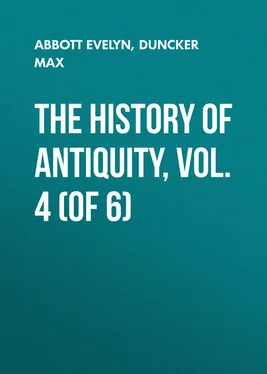Max Duncker - The History of Antiquity, Vol. 4 (of 6)
Здесь есть возможность читать онлайн «Max Duncker - The History of Antiquity, Vol. 4 (of 6)» — ознакомительный отрывок электронной книги совершенно бесплатно, а после прочтения отрывка купить полную версию. В некоторых случаях можно слушать аудио, скачать через торрент в формате fb2 и присутствует краткое содержание. Жанр: foreign_antique, foreign_prose, Историческая проза, на английском языке. Описание произведения, (предисловие) а так же отзывы посетителей доступны на портале библиотеки ЛибКат.
- Название:The History of Antiquity, Vol. 4 (of 6)
- Автор:
- Жанр:
- Год:неизвестен
- ISBN:нет данных
- Рейтинг книги:5 / 5. Голосов: 1
-
Избранное:Добавить в избранное
- Отзывы:
-
Ваша оценка:
- 100
- 1
- 2
- 3
- 4
- 5
The History of Antiquity, Vol. 4 (of 6): краткое содержание, описание и аннотация
Предлагаем к чтению аннотацию, описание, краткое содержание или предисловие (зависит от того, что написал сам автор книги «The History of Antiquity, Vol. 4 (of 6)»). Если вы не нашли необходимую информацию о книге — напишите в комментариях, мы постараемся отыскать её.
The History of Antiquity, Vol. 4 (of 6) — читать онлайн ознакомительный отрывок
Ниже представлен текст книги, разбитый по страницам. Система сохранения места последней прочитанной страницы, позволяет с удобством читать онлайн бесплатно книгу «The History of Antiquity, Vol. 4 (of 6)», без необходимости каждый раз заново искать на чём Вы остановились. Поставьте закладку, и сможете в любой момент перейти на страницу, на которой закончили чтение.
Интервал:
Закладка:
83
"Rigveda," 1, 35, according to Roth's translation; cf. Benfey, "Orient," 1, 53.
84
"Rigveda," 2, 38, according to Roth's translation, "Z. D. M. G." 1870, 306 ff.
85
Muir, loc. cit. 5, 171 ff. Kaegi, "Rigveda," 2, 43.
86
Kuhn, "Herabkunft des Feuers," s. 66.
87
"Rigveda," 1, 51, 5; 2, 12, 12.
88
"Rigveda," 1, 32, according to Roth's translation; cf. Benfey, "Orient," 1, 46.
89
"Rigveda," 1, 11; 1, 121.
90
Indra is derived by Benfey from syand , "to flow," "to drop," in which case we shall have to refer it to the rain-bringing power of the god. Others have proposed a derivation from idh , indh , "to kindle;" others from indra , "blue." In any case, Andra, the corresponding name in the Rigveda, must not be left out of consideration.
91
Muir, loc. cit. 5, 144.
92
Roth, "Zwei Lieder des Rigveda, Z. D. M. G.," 1870, 301 ff. Muir, loc. cit. 5, 147 ff.
93
"Rigveda," 4, 30; "Samaveda," Benfey, 1, 3, 2, 1. 1, 4, 1, 1.
94
"Samaveda," Benfey, loc. cit.
95
"Rigveda," 3, 59, in Muir, loc. cit. 5, 69.
96
"Rigveda," 1, 115, 1 in Benfey; "Orient," 3, 157; "Rigveda," 6, 51, 2; 7, 61, 1; 7, 63, 4; in Muir, loc. cit. 5, 157.
97
"Atharvaveda," 4, 16, according to M. Müller's translation "Essays," 1, 40, 41. Cf. Roth, "Atharvaveda," 8. 19.
98
"Rigveda," 7, 86, 89, according to Müller's rendering, "Essays," 1, 38, 39; cf. Muir's translation, loc. cit. 5, 63 ff. [who reads "like an inflated skin" for "like a cloud," etc.]
99
Windischmann, "Abh. der Münch. Akademie," 1847, s. 129.
100
"Samaveda," 1, 6, 2, 2; "Rigveda," 1, 2, 2; 1, 5, 5, and elsewhere.
101
"Samaveda," Benfey, 1, 4, 1, 1; 5, 2, 4, 1, 15, and elsewhere.
102
Muir, loc. cit. 5, 98, ff.
103
"Samaveda," Benfey, 1, 3, 2, 4.
104
"Samaveda," 2, 8, 2, 6.
105
"Samaveda," 1, 4, 1, 2; 2, 9, 2, 9.
106
"Samaveda," 1, 6, 2, 1.
107
"Rigveda," 1, 32; "Samaveda," 1, 3, 2, 4.
108
"Rigveda," 5, 31, 10; 1, 63, 2; 2, 20, 8; 1, 54, 8.
109
"Rigveda," 1, 126, 2, 3.
110
"Rigveda," 4, 50, 8, 9. Roth, "Z. D. M. G.," 1, 77. Lassen, loc. cit. 12, 951.
111
M. Müller, "Z. D. M. G.," 9, 16. These bright bodies of the fathers led to the idea that the souls of the fathers had adorned the heaven with stars, and that they were these stars. "Rigveda," 10, 68, 11.
112
"Atharvaveda," 3, 29, 3; in Muir, loc. cit. 5, 310.
113
Muir, loc. cit. 5, 308, 309, 311. In the later portion of the Rigveda, 10, 15, the old conception of the fathers is already changed. Three classes of fathers are distinguished, and burning and non-burning are mentioned side by side.
114
"Aitareya-Brahmana," 2, 17; in Muir, loc. cit. 5, 322.
115
"Rigveda," 10, 18; according to Roth's rendering, "Z. D. M. G.," 8, 468 ff.
116
"Rigveda," 10, 15, 14; in Muir, loc. cit. 5, 297.
117
"Atharvaveda," 18, 2, 37; in Muir, loc. cit. 5, 294.
118
M. Müller, "Die Todtenbestattung der Brahmanen," s. 14 ff.
119
"Rigveda," 9, 113, 7 ff.
120
This follows from the fact that the army of the confederates had to cross the Vipaça and Çatadru in order to reach the Tritsus.
121
In the Rigveda king Sudas is at once a son of Divodasa and a scion of the house of the Pijavanas, possibly because Pijavana was the father or some ancestor of Divodasa. In the Samaveda (2, 5, 1, 5) Divodasa is called the noble. In the book of Manu (7, 41; 8, 110) Sudasa is the son of Pijavana. In the genealogy of the kings of the Koçalas, by whom the Tritsus were destroyed, the Vishnu-Purana mentions in the fiftieth generation after Ikshvaku, the founder of the race, a king Sudasa, the son of Sarvakama, grandson of Rituparna. So also the Harivança, and in the Vishnu-Purana (ed. Wilson, p. 381) Vasishtha is the priest of king Sudas as well as of Nimi, the son of Ikshvaku. On the other hand the Vishnu-Purana (p. 454, 455) is aware of a second Sudas, the grandson of Divodasa, in the race of the moon. Viçvamitra is himself called a Bharata; we shall see below that the Mahabharata connects Viçvamitra with the genealogy of the kings of the Bharata. Cp. Roth, "Zur Literatur," S. 142 ff. [On the names of Indian rivers, see Muir, loc. cit. 2, 345 ff.]
122
Cf. Muir, loc. cit. 12, 339, where the hymn is translated.
123
Roth, "Zur Literatur," S. 87, 91 ff. [Rigveda, 3, 33; 7, 83. Muir, loc. cit. 322, 323.]
124
Manu, 1, 67 ff. [Muir, 1, 43 ff.]
125
Weber, "Jyotisham, Abh. d. Berl. Akad." 1862, s. 23 ff. and below.
126
With similar exaggeration "Duty" tells king Parikshit at the close of the Mahabharata that her four feet measured 20 yodhanas in the first age, 16 in the second, 12 in the third, whereas now in the Kaliyuga they only measure four yodhanas. The whole narrative is intended to point out that in the Kaliyuga even Çudras could become kings. The Vishnu-Purana (ed. Wilson, p. 467) calls the first Nanda who ascended the throne of Magadha in 403 B.C. the son of a Çudra woman.
127
"Bhagavata-Purana," 9, 14.
128
Lassen, "Ind. Alterth." 12, 600.
129
Arrian, "Ind." 7, 8, 9. Plin. 6, 21, 4. Solin. 52, 5. As to the numbers, Bunsen, "Ægypt." 5, 156; Von Gutschmid, "Beiträge," s. 64. The duration of the first interruption is lost; but it was less than the second, for Arrian says that the second continued as much as 300 years. Perhaps the number of the first and third interruptions taken together are as long as the second. Diodorus (2, 38, 39) allots the 52 years to Dionysus, which Arrian gives to Spatembas.
130
That the Kalpa — i. e. the great world-period – was a current conception in the third century B.C. is proved by the inscriptions of Açoka at Girnar. Lassen, loc. cit. 22, 238.
131
Not more than nine names can be given to the dynasty of the Nandas, which reigned for 88 years before Chandragupta; seventeen for the dynasty of the Çaiçunagas, even if Kalaçoka's sons are all counted as independent regents; and five for the Pradyotas. For the Barhadrathas the Vayu and Vishnu-Puranas give 21 kings after Sahadeva, the Bhagavata-Purana 20, the Matsya-Purana 32. Hence, taking the highest figures, the united dynasties number 64 reigns. To these are to be added the seven names which connect Brihadratha with Kuru, and the 31 or 21 names given in the longer and shorter lists of the Mahabharata between Kuru and Manu.
Читать дальшеИнтервал:
Закладка:
Похожие книги на «The History of Antiquity, Vol. 4 (of 6)»
Представляем Вашему вниманию похожие книги на «The History of Antiquity, Vol. 4 (of 6)» списком для выбора. Мы отобрали схожую по названию и смыслу литературу в надежде предоставить читателям больше вариантов отыскать новые, интересные, ещё непрочитанные произведения.
Обсуждение, отзывы о книге «The History of Antiquity, Vol. 4 (of 6)» и просто собственные мнения читателей. Оставьте ваши комментарии, напишите, что Вы думаете о произведении, его смысле или главных героях. Укажите что конкретно понравилось, а что нет, и почему Вы так считаете.












